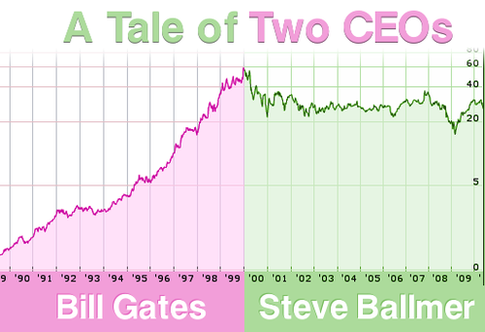A few days ago someone posted a question on Quora: Chief Executive Officers: Who is the greatest living CEO?
One of the answers (unusually, posted by an anonymous member), simply posted the following chart:
Originally cited in a 2010 ZDNet article, it is a thought provoking illustration. On the surface it seems to scream “aha – look how much better Bill Gates was, than Steve Ballmer.” But the reality is a lot more complicated than this simplistic observation:
Different Skill Sets
There’s a huge difference between running a company in its startup and growth phases, and its big fortune-100 public-company phase (as Mark Zuckerberg and his investors are about to find out). Most entrepreneurs, and most managers for that matter, perform better during one phase than the other. Many thrive and succeed during all the phases – Michael Dell, Larry Ellison – are just two that come to mind but there are many others. [note: Steve Jobs is such an outlier to almost any conversation about business and entrepreneurship that it’s best to avoid using him as an example for any broader lessons.]
Building a startup is all about growth. In fact there is usually ‘nowhere to go but up’, and hockey stick graphs are everywhere. Startups are about taking risks, being a visionary, being resourceful, nimble and unencumbered by the typical weight carried by a large organization. Being CEO of a public company often forces the CEO to focus on the quarterly – not the visionary – future. Entrepreneurs usually only have to answer to themselves, and perhaps a few key investors, employees and customers. Contrary to the popular lore, the CEO of a public company answers to almost everyone – or at least gets to have every aspect of his work scrutinized and second-guessed by the media, the public and the industry.
Different Passions
Certainly not every entrepreneur wants to be the CEO of a large corporation – even one of his or her own creation. Put simply, there’s a certain point where it just stops being fun – usually after their company gets their first major investments, and establishs large customer base. It’s no wonder that many founder/CEOs step down and turn the reigns over to an outside CEO after the initial startup & growth phases; they usually find another role where they can engage their entrepreneurial passions. Sometimes they can do this within the company, sometimes not.
Misleading Metrics
Have you noticed anything about the chart? It’s misleading on many levels – not to mention that it is comparing two CEOs during two completely different situations. First, the chart ignores leading indicators. This is like publishing a chart of economic health, comparing US Presidents from 1925 to 1935: The stock market crashed in October 1929 – just less than 8 months after Herbert Hoover took office. It would be misleading to look the at prosperity in the years prior to the crash (the roaring 20’s), and then look at The Great Depression and think that each serving President (Coolidge – Hoover – Roosevelt) was solely responsible. In fact, the US unemployment rate was astronomically high (15-21%) during Roosevelt’s first 8 years. Yet, it would be unfair to compare each President on these metrics and attribute their competence based merely on the metrics during their years in office.
Also – the Gates-Ballmer chart itself is flawed: The vertical scale (Y-Axis) is not uniform, nor is it a true logarithmic scale – which would be inappropriate for this kind of graph anyway. The scale is perfectly designed to make the point that Gates presided over more growth and economic success, than did Ballmer (ignoring the fact that Ballmer was Gates’ right hand man during that period of growth, while Bill Gates left with nearly a clean break from managing the company).
Back to the Question
Who’s the greatest living CEO? Without delving further into the accuracy of the above metrics, it is fair to ask “should a CEO’s greatness be based solely on their companies market value or even growth?” Almost certainly if Steve Jobs were alive many would cite him to be the greatest living CEO. He certainly did not excel or thrive during every stage of his company’s growth. Not only was he outsted during Apple’s transition to becoming a public corporation, his next venture, appropriately called NeXT, was not a rousing success by many entrepreneurial measures. And even when returned to Apple and re-catapulted them to new heights, was it because of his prowess as a CEO or because he was a legendary product designer and market visionary?
In my answer I offered a few possibilities, but also wrote:
And as much as I hate to say it … Mark Zuckerberg has done an incredible job transforming Facebook from a near trivial social network (in the shadow of MySpace) to the giant it is today … having the tenacity to stick to his plans without yielding or selling out early, AND for bringing on the right people (advisors, board members and execs) ..
I’m not sure why I felt that I hated to say it, certainly insane jealous played a small part. One thing is clear to me: When we collectively look at CEOs today whom we admire and call “great”, we usually will cite people like Steve Jobs, Bill Gates, Mark Zuckerberg much more often than perhaps a Jack Welch, Steve Ballmer or even Tim Cook. It’s because, at least in America culture, we seem to admire the leader who has attained that position by building the organization they lead, not merely because they ascended to the position -regardless of their accomplishments once they’re in the big chair.

